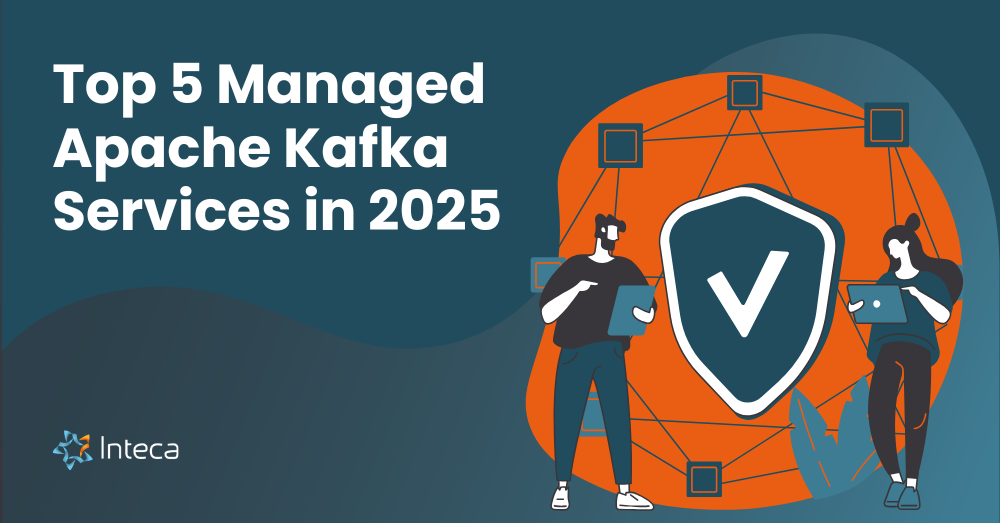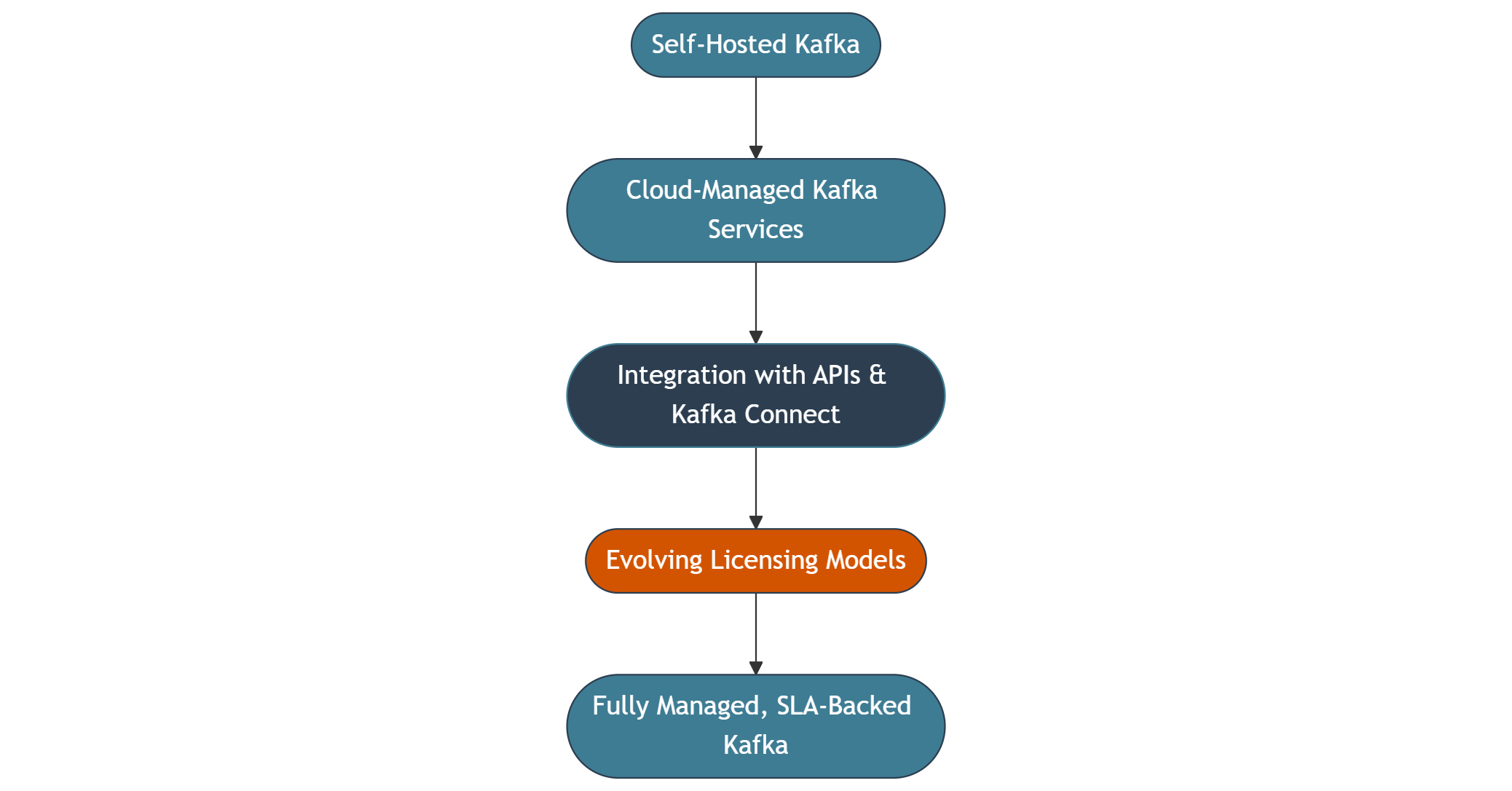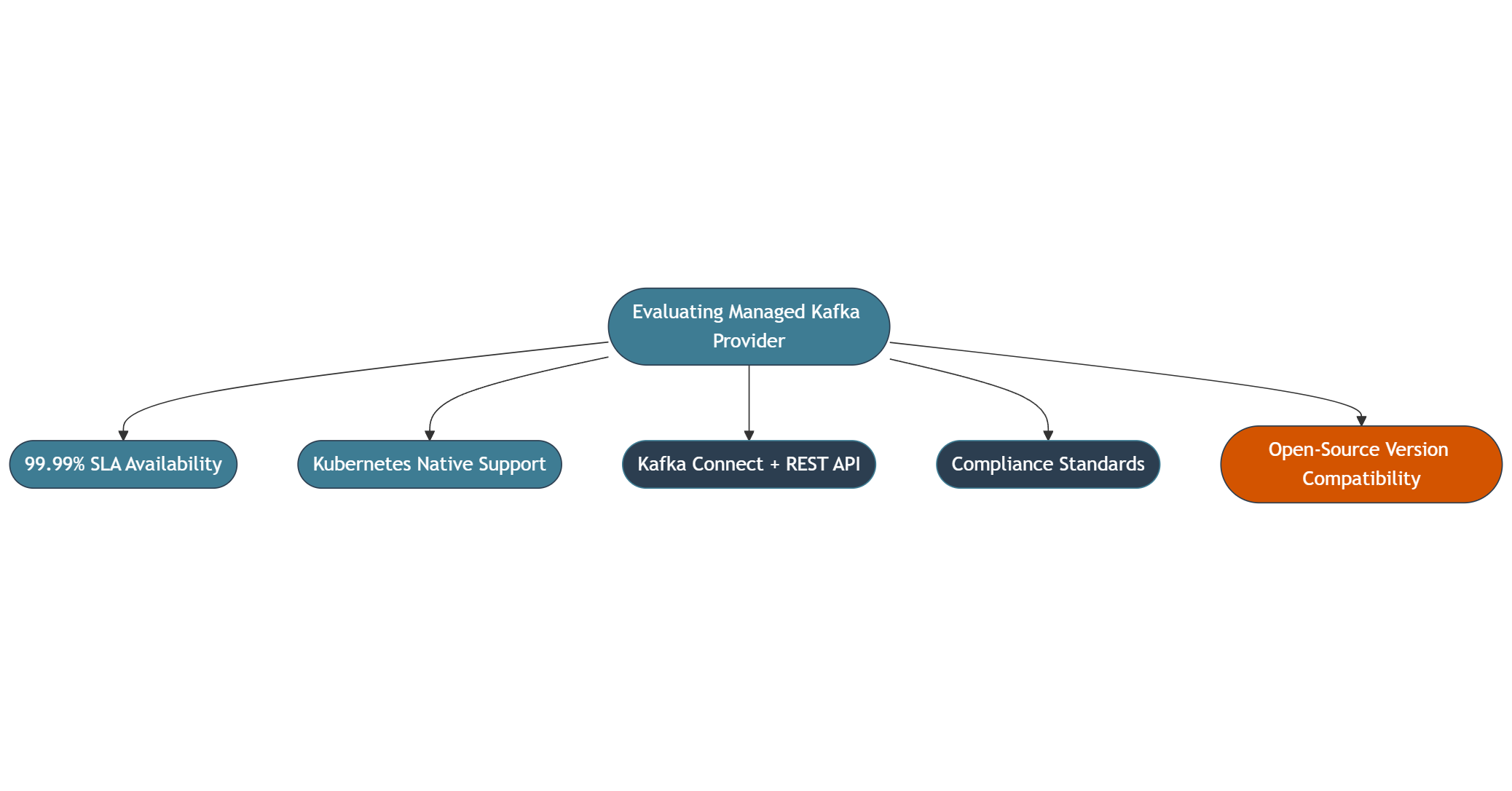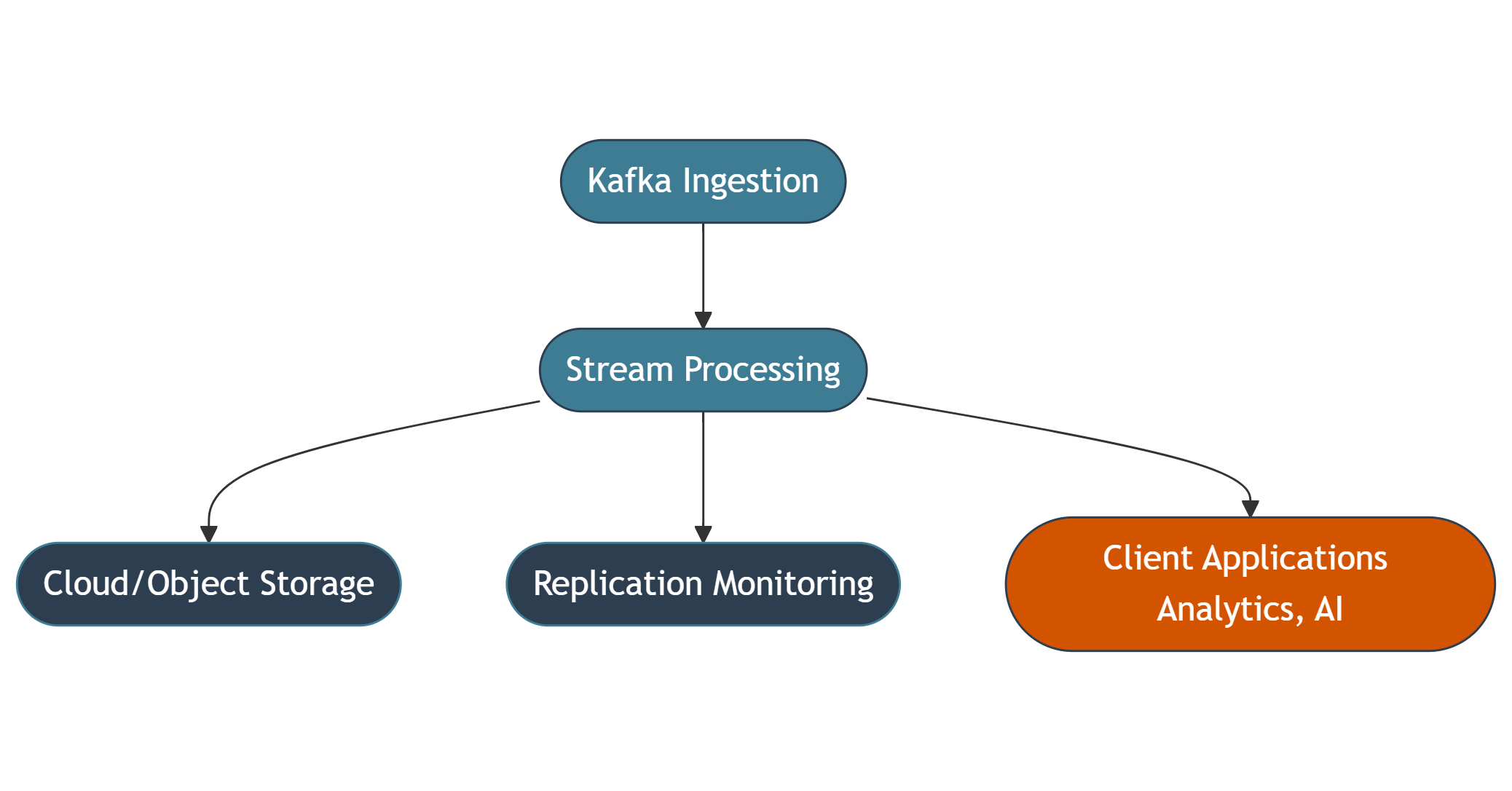As businesses increasingly rely on real-time data streaming, the demand for robust Kafka solutions continues to rise. In 2025, the landscape of managed Kafka providers is set to evolve, offering enhanced scalability, security, and ease of use. Discover the top contenders poised to transform how organizations harness the power of Kafka.
What is Managed Apache Kafka?
Managed Apache Kafka is a service model where a provider deploys, operates, and scales Apache Kafka clusters on behalf of an organization. The provider is responsible for broker provisioning, monitoring, upgrades, security patching, and high-availability configuration, while users interact with Kafka through standard APIs.
Such a service reduces the operational complexity of running distributed streaming systems and ensures predictable performance through SLA-backed infrastructure. As organizations increasingly rely on real-time data pipelines and event-driven architectures, this operational model explains why managed Kafka services continue to see rapid adoption.
Why Managed Kafka Services Are Booming in 2026?
In 2025, the demand for managed Kafka services is surging as organizations increasingly rely on Apache Kafka® for real-time data processing. With the ability to use Apache Kafka to build streaming data pipelines, businesses are migrating from self-hosted solutions to cloud managed services for Apache. The rise of offerings like Google Cloud Managed Service highlights the preference for highly available Apache Kafka clusters that ensure robust uptime and performance via uptime SLA.
The transition to managed clusters allows companies to focus on innovation rather than infrastructure, streamlining the use of managed Kafka connect with API integrations. As organizations capitalize on Google Cloud Storage and private cloud solutions, they often rely on Apache Kafka connectors to enhance their data flow. This shift is further supported by evolving licensing trends, as seen in Confluent’s movement away from Apache 2.0, paving the way for new Apache Kafka deployments.
Ultimately, the transition towards hosted Apache Kafka services offers businesses the scalability and flexibility they need to run Apache Kafka efficiently, powering their data in real time and elevating their Kafka offering. As more organizations adopt highly available Apache Kafka solutions, the landscape of data streaming is set for continuous transformation, facilitating seamless integration and enhanced performance across platforms.
How should you evaluate a managed Kafka provider?
When evaluating a managed service for Apache Kafka, it’s essential to assess several key factors that directly impact your kafka workloads and the overall performance of your kafka cluster. Look for providers that offer high availability with uptime SLAs of at least 99.99, ensuring your stream data is consistently accessible. Another critical aspect is Kubernetes support, which can facilitate the management of apache kafka clusters in a cloud-native environment. Integration capabilities are also vital; assess how well the provider supports Kafka Connect and REST APIs for seamless data flow and analytics. Lastly, ensure that the provider adheres to necessary compliance standards for your specific use case.
A truly fully managed Kafka service should handle the deployment, scaling, and maintenance of your apache kafka infrastructure, allowing you to focus on building kafka applications. This includes automatic provisioning of brokers, monitoring performance metrics, and managing tiered storage for cost-effective cloud storage solutions. Popular cloud environments like AWS MSK, GCP, and Azure provide cloud managed services that simplify the management of open source Apache Kafka while ensuring low latency for your data streaming needs.
When considering migration to a cloud service, be mindful of the version of apache kafka being used and whether it aligns with your existing kafka applications. A provider that supports the latest open source features can offer better performance and insights. Look for fully managed Apache Kafka providers that can efficiently handle kafka data with optimized latency and robust analytics capabilities, ensuring your workload runs smoothly.
Why should I use a managed cloud Kafka service?
Using a managed cloud Kafka service allows you to leverage Apache Kafka to build pipelines efficiently. Engineers often rely on Apache Kafka for its robust, scalable architecture, simplifying data streaming.
Additionally, Kafka is an open-source solution that runs seamlessly in the cloud, ensuring high availability. With a dedicated Kafka team managing the infrastructure, you can focus on using Kafka for cloud logging and analytics without the operational overhead.
Comparing Kafka Providers? Quick list of 5 Managed Kafka Services in 2026
Managed Apache Kafka services eliminate the complexity of running and scaling Kafka clusters, enabling teams to focus on building real-time, event-driven applications. Here’s a curated list of the top Kafka providers leading the space in 2025. Ranked by their core strengths, platform maturity, and operational flexibility.
1. Inteca Managed Kafka – Kafka on K8S for enterprises
- Summary: Inteca offers managed Apache Kafka clusters with native Kubernetes support, tailored for real-time data pipelines. The service emphasizes European data residency (GDPR), flexible deployments (BYOC/hybrid), and high-touch support.
-
Strengths: Kubernetes-native, GDPR-ready, local expertise, integration with Apache Camel and custom connectors
-
Challenges: Less known globally, though highly competitive for EU-based teams
-
Notable use case: Ideal for mid-sized enterprises in Europe needing low-latency, real-time architecture with strong SLA and DevOps integration
2. Confluent Cloud
- Summary: Built by the original Kafka creators, Confluent Cloud delivers a premium, fully managed Kafka service. It offers advanced features such as ksqlDB, Schema Registry, Tiered Storage, and integrations with Flink, Databricks, and AI-ready architectures.
-
Strengths: Rich enterprise tooling, wide adoption, strong brand
-
Challenges: Premium pricing, some components now under proprietary license (Confluent Community License)
-
Notable use case: Ideal for enterprises building large-scale real-time pipelines with high throughput and availability requirements
3. Amazon MSK (Managed Streaming for Kafka)
- Summary: MSK simplifies Kafka operations within the AWS ecosystem, offering both provisioned and serverless deployment options. Integrated with AWS services like S3, Lambda, Glue, and CloudWatch.
- Strengths: Seamless AWS integration, flexible scaling, strong IAM-based security
- Challenges: Not a fully hands-off experience; limited native support for the full Kafka ecosystem (e.g., no managed Schema Registry)
- Notable use case: Best fit for AWS-centric teams needing Kafka with minimal architectural changes
- Explore Amazon MSK
4. Aiven for Apache Kafka
- Summary: Aiven delivers a multi-cloud, open-source-based Kafka service with transparent pricing and flexible deployments on AWS, GCP, and Azure. It includes Kafka Connect, Schema Registry (Karapace) and support for Flink.
-
Strengths: Developer-friendly CLI, Terraform support, automatic AZ failover, GDPR compliance
-
Challenges: Kafka backups not standard; restoring consumer offsets requires workarounds
-
Notable use case: Perfect for DevOps teams and SaaS providers wanting open-source purity without vendor lock-in
5. Instaclustr Managed Kafka
- Summary: Instaclustr focuses on reliability and data sovereignty, offering managed Kafka along with other open-source technologies (Cassandra, OpenSearch, etc.). Strong support SLAs and expert management set it apart.
- Strengths: SLA-backed uptime, EU-hosting options, full open-source stack
-
Challenges: Less UI polish than Confluent/Aiven; pricing quote-based
-
Notable Use Case: Popular among finance and government clients seeking strict compliance and open standards
Pro Tip for buyers:
If you’re operating in Europe or Poland, be sure to weigh data residency, GDPR posture, and on-premises flexibility. Providers like Inteca and Instaclustr have a strategic edge in these areas.
Kafka Managed Services Comparison Table
| Provider | Fully Managed | Kubernetes Native | Kafka Connect Support | SLA Uptime | Cloud Options | Best For |
|---|---|---|---|---|---|---|
| Inteca | ✅ Yes | ✅ Yes | ✅ Yes | 99.99% | Customizable (incl. hybrid/cloud-native) | Real-time pipelines, Kubernetes-native teams |
| Confluent Cloud | ✅ Yes | 🟡 Partial | ✅ Yes | 99.95% | AWS, GCP, Azure | Large enterprises, real-time AI apps |
| Amazon MSK | 🟡 Partial | ❌ No | ✅ Yes | 99.9% | AWS only | AWS-heavy workloads |
| Aiven | ✅ Yes | ✅ Yes | ✅ Yes | 99.99% | AWS, GCP, Azure, DO | Developers, startups |
| Instaclustr | ✅ Yes | ✅ Yes | ✅ Yes | 99.95% | AWS, GCP, Azure | Regulated industries, compliance-first teams |
How are Kafka managed services shaping the future in 2026?
In 2025, Kafka Managed Service will be pivotal in shaping the future of data processing through its innovative streaming platform. By leveraging Apache Kafka as a service, organizations can utilize stream processing to build resilient data pipelines, whether in a virtual private cloud (VPC) or in a hybrid cloud setup. This fully managed service enables engineers to operate highly available Apache Kafka instances, ensuring optimal cluster performance.
With the ability to replicate Kafka clusters, businesses can achieve seamless data resilience and cloud monitoring. Furthermore, the managed Kafka offering supports customer-managed encryption keys, providing enhanced security for sensitive data. As organizations increasingly adopt streaming analytics, they can rely on Kafka support to utilize object storage effectively, whether deploying Kafka on cloud or on-prem solutions. Ultimately, Apache Kafka remains a cornerstone of modern data architecture, enabling the efficient processing of real-time data streams.








